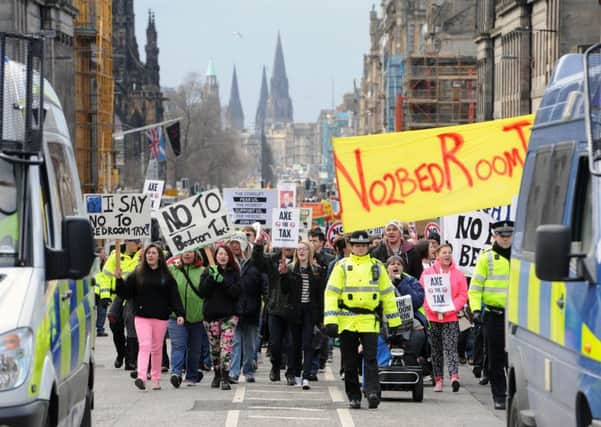Domestic abuse victim and carers win '˜bedroom tax' challenges


Prime Minister David Cameron said he would study the judgment after Labour called for the abolition of the “bedroom tax”.
The judges declared a woman referred to as “A”, who lives in a council house fitted with a panic room to protect her from a violent ex-partner, and Paul and Sue Rutherford, who look after 15-year-old grandson Warren, had “suffered discrimination” contrary to Article 14 of the European Convention on Human Rights (ECHR).
Advertisement
Hide AdAdvertisement
Hide AdA spokesman for the Department for Work and Pensions said it had been granted permission to appeal to the Supreme Court, adding: “We fundamentally disagree with the court’s ruling on the ECHR, which directly contradicts the High Court.”
• READ MORE: Call for powers to scrap ‘bedroom tax’ in Scotland
Mr Rutherford, from South Wales, said: “I could almost cry with happiness. Other people are going to benefit from this decision as well. That was partly why we did it.”
At the Court of Appeal it was argued there was unlawful discrimination against victims of domestic violence and children like Warren.
Lord Thomas, Lord Justice Tomlinson and Lord Justice Vos allowed the appeals on the ground that the “admitted discrimination in each case” had “not been justified by the Secretary of State”.
One of the cases was brought by single mother A and concerned the effect of the policy on women living in Sanctuary Scheme homes specially adapted because of risks to the women and children who live in them. The other, brought by the Rutherfords, involved its impact on seriously disabled children who need overnight care.
The “bedroom tax” came in in April 2013 and cut benefits to householders “if the accommodation in which a person lived exceeded the number of bedrooms required as defined by a formula”.
In Scotland, the Scottish Government has undertaken to subsidise anyone affected by the tax through local authority funding, since it is unable to repeal benefits legislation, which is a reserved matter.
Advertisement
Hide AdAdvertisement
Hide AdDuring Prime Minister’s Questions, Mr Cameron said that “it’s unfair to subsidise spare rooms in the social sector if you don’t subsidise them in the private sector. That is a basic issue of fairness.”